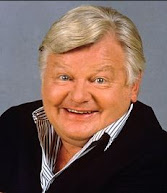As a night owl I'm typically beginning my day in the mid-morning or afternoon. I woke up today and after taking my morning medication I got onto the internet and found out Larry King passed away at age 87. My grandfather religiously watched Larry's show on CNN every night. I don't know if he watched it in it's earliest years but he definitely watched it throughout the 1990s and into the 2000s. Larry's CNN television show, Larry King Live, aired 25 years: 1985-2010. I would sometimes watch Larry's television show if he happened to have a guest I was interested in. Larry would sometimes have celebrities on that you wouldn't regularly see on any talk show on cable or network television...by that I mean he would have legendary actors/actresses on. Their appearance was almost always tied to a just released autobiography, some upcoming public event, or a milestone in their career. I'm writing this blog entry through my own point of view and my own interpretation of events. If you read something on here and think to yourself "hey, that doesn't sound right" or "that doesn't make sense" I encourage you to seek out information on Larry King for specifics. This is just my take on Larry King through my own research and through how I remember him.
Larry's career began in radio in Florida in the 1950s. He was interested in sports and political news and spent much of his career interviewing sports, political, and entertainment figures from all time periods and backgrounds. He also interviewed infamous personalities...giving airtime to people that a general audience may view with skepticism or mistrust (psychics, fortune tellers, mind readers) or he'd have exclusive interviews with some sort of public figure that had either just been released from prison or were heading for prison and it wouldn't be uncommon for tabloid-driven figures to show up on Larry's shows. However, for the most part, Larry's programs stayed within the realm of traditional guests (actors/actresses, politicians, authors). Larry's long running radio series, The Larry King Show, aired in syndication and for much of it's run it aired during an all-night time slot on the Mutual Broadcasting System. The show had started out locally on a Florida radio station and it went national.
The concept of the show was for Larry to speak to the audience and relate his opinions regarding the news of the day; interview a guest; and then take calls from listeners who had questions for the guest and then, after the guest left, Larry would take calls from listeners who discussed any topic. This series ran almost 20 years (1978-1994) and aired Monday through Friday from 12am to 5:30am. In it's final year the show was no longer airing in an all-night slot and was placed in afternoon time slots which, by the early '90s, was becoming increasingly crowded as AM talk radio was expanding. Some local radio stations began to fill their mid-morning, afternoon, and early evening time slots with syndicated talk programs...call-in shows that originated from New York City, Chicago, Washington, D.C., or Los Angeles. Then there were radio stations that preferred to 'keep it local' and have call-in/talk radio shows hosted by local radio personalities and local callers. Larry's syndicated radio series came to an end in 1994...swallowed up by the competitive nature of talk radio and the lack of major market clearances. Larry continued on, of course, hosting the CNN television series Larry King Live.
When he stepped away from the CNN show in 2010 it was played up in the media that he was forced off the network due to his folky, traditional, non-threatening demeanor being in sharp contrast to the bomb throwing, lightning rod personalities that were reshaping the execution of cable news...particularly from the hosts airing prior to and after Larry's 9pm show. Larry's show wasn't a gigantic ratings champion at 9pm anymore because rival network, Fox News Channel, had audience sizes almost doubled that of CNN and MSNBC. His departure from CNN in 2010 was a worldwide news event. He didn't entirely retire in 2010...he got involved with social media/digital media. He had talk shows that were hosted by Hulu, Ora TV, and RT America: Larry King Now (2012-2020) and Politicking with Larry King (2013-2021). Ora TV is a company Larry created with his wife, Shawn Southwick. There are 1,000 episodes of Larry King Now and there's 257 episodes of the weekly series, Politicking with Larry King. On internet/digital television they're called podcasts rather than broadcasts.
One of the interesting things that most don't know but I had actually seen on Game Show Network in the early 2000s is Larry appearing on an episode of To Tell the Truth in the early '80s before he became nationally recognizable. It was hugely funny, to me, to see two people walk out and say "I'm Larry King" and then see the actual Larry King walk out and say that they're Larry King. The announcer's line was: "Only one of these men is the real Larry King and is sworn To Tell the Truth; the other two are imposters.". Larry had been hospitalized since December 2020 with complications from COVID-19. The news of his hospitalization, though, wasn't released to the public until January 2nd. In the press release on January 2nd it was reported that Larry had been hospitalized for the last 10 days...which, as mentioned, would take one back to December 2020.
He won a lot of industry awards in his career. He won two Peabody Awards for Excellence in Broadcasting (1982 for radio and 1992 for television). He won 10 Cable Ace Awards. That award was handed out between the years 1978 and 1997. He was inducted into the National Radio Hall of Fame in 1989 and received induction into the Broadcasting Hall of Fame in 1992.
 |
| Larry King: 1933-2021 |










